2016年辽宁沈阳第二十一中学高一英语教案:Module 3 Music(外研版必修2)
辽宁省沈阳市第二十一中学高中英语 Module 3 Music Reading课件 外研版必修2

Decide if these statements are true or false.
T 1. Haydn is known as “the farther of the symphony.” 2. When Mozart was four, he learned to play the piano. 3. Mozart composed more than 600 pieces of music. 4. Beethoven’s mother taught him to play the piano. 5. Beethoven continued composing after he went deaf.
Three Great Austrian Composers
பைடு நூலகம்
√
Three Great Composers of the Eighteenth Century Three Great Child Composers
Read quickly and fill in the table.
Name Haydn
Then Mozart met Beethoven and was impressed by him. It was __________ Haydn who __________ encouraged Beethoven to move to Vienna. Beethoven became very popular _______ in the Austria. As he grew older, he began to go _____ deaf . He became completely deaf during the last years of his life, but he ____________________. continued composing
辽宁省沈阳市第二十一中学高中英语Module3Musi(精)
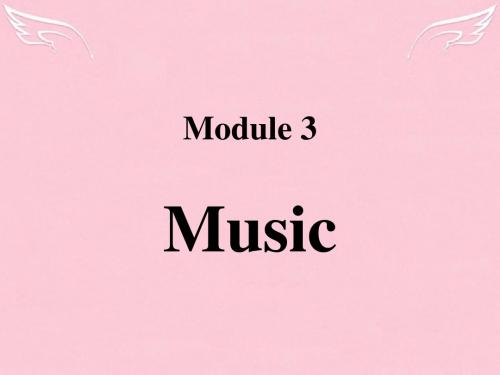
4. Which instruments are used in traditional Chinese music? erhu drums 5. Which word means someone who writes music? composer 6. Which word means a group of people who sing together? choir
Module 3
Music
Do you know the history of the music player?
How many instruments have you used?
phonograph
recorder
walkman
CD player
MP3
MP4
itouch
MP5
How many types of music do you know?
He teaches at the Central Conservatory of Music, where he serves as Assistant President and vice dean of the composition department. His father is the composer Ye Chunzhi.
Discussion
Work in groups. Discuss these questions about the instruments.
1. Which of the instruments do you like listening to? 2. Which famous musicians play them?
(Give your own idea.)
辽宁省沈阳市第二十一中学高中英语Module3Music教案外
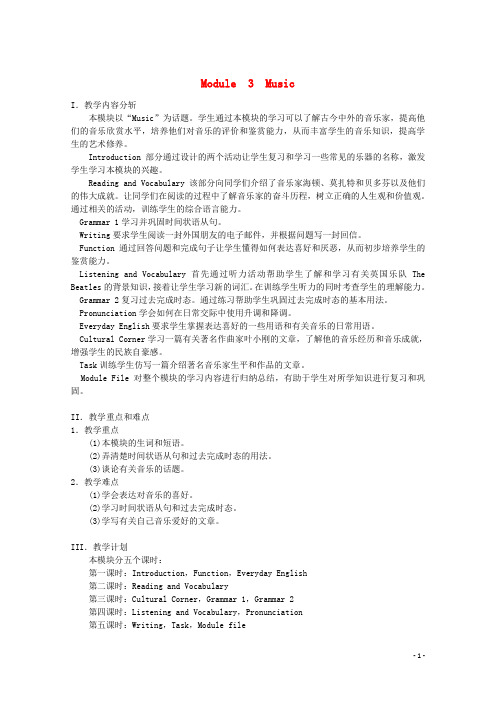
Module 3 MusicI.教学内容分斩本模块以“Music”为话题。
学生通过本模块的学习可以了解古今中外的音乐家,提高他们的音乐欣赏水平,培养他们对音乐的评价和鉴赏能力,从而丰富学生的音乐知识,提高学生的艺术修养。
Introduction部分通过设计的两个活动让学生复习和学习一些常见的乐器的名称,激发学生学习本模块的兴趣。
Reading and Vocabulary该部分向同学们介绍了音乐家海顿、莫扎特和贝多芬以及他们的伟大成就。
让同学们在阅读的过程中了解音乐家的奋斗历程,树立正确的人生观和价值观。
通过相关的活动,训练学生的综合语言能力。
Grammar 1学习并巩固时间状语从句。
Writing要求学生阅读一封外国朋友的电子邮件,并根据问题写一封回信。
Function通过回答问题和完成句子让学生懂得如何表达喜好和厌恶,从而初步培养学生的鉴赏能力。
Listening and Vocabulary首先通过听力活动帮助学生了解和学习有关英国乐队The Beatles的背景知识,接着让学生学习新的词汇。
在训练学生听力的同时考查学生的理解能力。
Grammar 2复习过去完成时态。
通过练习帮助学生巩固过去完成时态的基本用法。
Pronunciation学会如何在日常交际中使用升调和降调。
Everyday English要求学生掌握表达喜好的一些用语和有关音乐的日常用语。
Cultural Corner学习一篇有关著名作曲家叶小刚的文章,了解他的音乐经历和音乐成就,增强学生的民族自豪感。
Task训练学生仿写一篇介绍著名音乐家生平和作品的文章。
Module File对整个模块的学习内容进行归纳总结,有助于学生对所学知识进行复习和巩固。
II.教学重点和难点1.教学重点(1)本模块的生词和短语。
(2)弄清楚时间状语从句和过去完成时态的用法。
(3)谈论有关音乐的话题。
2.教学难点(1)学会表达对音乐的喜好。
(2)学习时间状语从句和过去完成时态。
辽宁省沈阳市第二十一中学高中英语 Module 3 Music Reading and Vocabulary导学案(无答案)外研版必修2
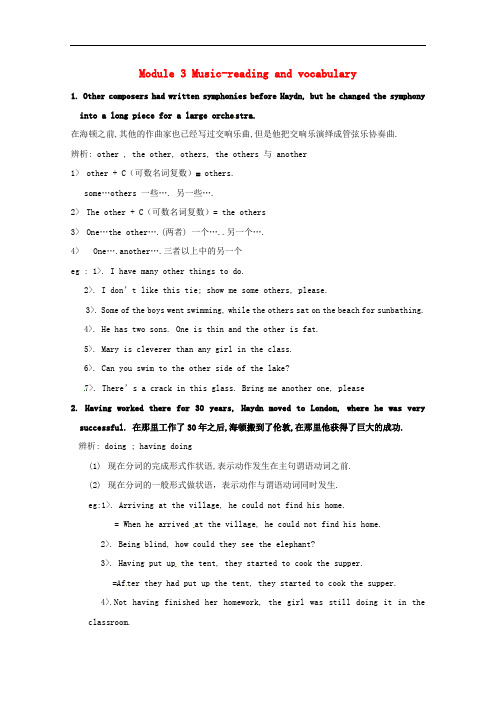
Module 3 Music-reading and vocabulary1. Other composers had written symphonies before Haydn, but he changed the symphony into a long piece for a large orche stra.在海顿之前,其他的作曲家也已经写过交响乐曲,但是他把交响乐演绎成管弦乐协奏曲.辨析: other , the other, others, the others 与 another1>other + C(可数名词复数)= others.some…others 一些…. 另一些….2>The other + C(可数名词复数)= the others3>One…the other….(两者) 一个…..另一个….4>One….another….三者以上中的另一个eg : 1>. I have many other things to do.2>. I don’t like this tie; show me some others, please.3>. Some of the boys went swimming, while the others sat on the beach for sunbathing.4>. He has two sons. One is thin and the other is fat.5>. Mary is cleverer than any girl in the class.6>. Can you swim to the other side of the lake?7>. There’s a crack in this glass. Bring me another one, please2. Having worked there for 30 years, Haydn moved to London, where he was very successful. 在那里工作了30年之后,海顿搬到了伦敦,在那里他获得了巨大的成功.辨析: doing ; having doing(1)现在分词的完成形式作状语,表示动作发生在主句谓语动词之前.(2)现在分词的一般形式做状语,表示动作与谓语动词同时发生.eg:1>. Arriving at the village, he could not find his home.= When he arrived at the village, he could not find his home.2>. Being blind, how could they see the elephant?3>. Having put up the tent, they started to cook the supper.=Af ter they had put up the tent, they started to cook the supper.4>.Not having finished her homework, the girl was still doing it in theclassroom.3.He only lived 35 years and he composed more than 600 pieces of music.More than 的用法:1>more than +数词, 意思是“超过…..以上” “多于”Her repor t lasted more than three hours.____________________________________2>more than + one +n. =many a +n.More than one student has read the novels written by David.__________________________________________3>more than +形容词或动词, 意思为“非常”.She is more than pleased with the result.What he did more than surprised me.4>more than +n. 意思是“不仅仅是……”China Daily is more than a newspaper; it also helps me learn English.5> more than +从句, 意思是“超出某人力量,知识等的范围”That’s more than I can do.The beauty of the girl is more than I can describe..4. By the time he was 14, Mozart had composed many pieces for the harpsichord, pianoand violin, as well as for orchestras. 到他14岁的时候,莫扎特就不仅为管弦乐队,还为大键琴,钢琴和小提琴创作了许多首曲子.b y the time 的用法:1>by the time +一般过去时, 主句时态为过去完成式eg. By the time he came back from abroad, his hometown had completely changed. 到他从国外回来的时候, 他的家乡已完全发生了变化.到他12 岁的时候,他已自学了数学.____________________________________.2>by the time+ 一般现在时, 主句用一般将来时或将来完成时.Eg. a. I’ll finish paying for my house by the time I retireb. 到他来的时候, 我就完成这幅画了.____________________________________________________as well as 的用法:作为固定短语, 意思是“除……以外还……”, “和…..一样也……”eg. a. English, as well as maths and Chinese, is of great importance.____________________________________________b. 这男孩既健康有活泼_____________________________________i.as well as 之后连接动词,则要用动名词.eg. As well as being a pop star, John teaches at a well-known university.除了一名歌星外,约翰还在一所知名大学任教.5.While he was still a teenager, Mozart was already a big star and toured Europegiving concerts.giving concerts 作伴随状语,表示“ give” 伴随着主句动作“tour” 发生.eg. a. The children walked, singing. 孩子们边走边唱.b. 她躺在草地上,想着什么.________________________________________c. She stayed up late, preparing her speech.6.Haydn met Mozart in 1781 and was very impressed with him.1781年,海顿遇到莫扎特,并对他留下了深刻的印象.eg. The book did not impress me at all.The headmaster impressed me with his kindness.常用搭配: impress sb (with sth ) 给予某人深刻印象impress sth on /upon sb 使某人铭记某物be impressed with/ by 给……留下印象eg. My father impressed me with the importance of work.= My father impressed on me the importance of work.He was deeply impressed by what he had seen in China.7.However, it was Haydn who encouraged Beethoven to move to Vienna.然而,正是海顿鼓励贝多芬搬到维也纳去的.强调句结构: It be + 要强调部分+ that/ who +其他部分i.It was John who wore his best suit to the party yesterday.(主语)ii.It was his best suit that John wore to the party.(宾语)iii.It was yesterday that John wore his best suit to the party.(时间状语) 使用强调句应注意的几点:a.强调句结构中的时态主句和从句一致.eg. It was my two brothers who knew him best.b.强调主语时,从句中的谓语动词在人称和数上应与强调部分一致.eg. It is I who am hungry.c.如果强调一般疑问句中的成分时,要用一般疑问式:即:Is/Was + it + 被强调部分 +that/who +句子剩余部分eg: Was it my brother who told you this?d.强调特殊疑问句中的成分时,要用其特殊疑问式, 既:特殊疑问式+ is/was + it + that + 句子剩余成分eg. Why is it that they don’t like me ?8.As he grew older, he began to go deaf.go 为系动词, 表示变得, 变成(某中状态). 常表示由好变坏的情况.eg. Fish goes bad in hot weather.The well has gone dry.辨析: get, grow, turn, become, be.1>get 指变的结果,通常接形容词.eg. I got tired for hard work.2>grow表示渐次成为新的状态,后接形容词或动词不定式.eg. It’s growing warm3>turn表示“突变”,接单数可数名词时不加冠词eg. My face turned red.4>become是最普通的用语,后接名词或形容词。
高中英语 Module 3《music》教案 外研版必修2

Module 3 musicAims and requirements●To enable the students to listen and talk about likes and dislikes (especially about music and musicians),encouraging them to try the vocabulary and everyday English in this unit●To develop the students’ reading ability●To help the students learn and use two grammars (adverbial clause of time and the past perfect tense) in different situations●To help the students to write a biography of a person, using the time expressions in Grammar 1Teaching proceduresPeriod 1 Introduction ,Warming upTeaching aims:Enabling the students to1. know some words about music2. know something about three great posersstep1. Warming up by listening pieces of music and asking questionsPlay several pieces of music (music from Haydn, Mozart and Beethoven will be best) to let the students listen and appreciate, then ask them:1) Do you like music?2) What about these pieces?3) What is your favorite kind of music?4) Who is your favorite musician? And who is your favorite poser?step2. Warming up by showing some pictures and discussing1) Do you know who they are?2) What kind of things are these pictures connected with, science, culture, politics, painting, drawing or music?step3. Warming up by listening to a piece of musicGood morning, class. Today we are going to read a passage about three great musicians who are all posers. A poser is a musician who writes pieces of beautiful music forothers to sing or to play. Now,let’s listen to a piece of music.(the teacher playsa piece of music ----er quan yingyue)1.do you know what kind of music it is?2.whose work is it?3.what kind of music is it?4.what is your feeling after listening to it?Step 4 show the following picturesAnd make the students familiar with these new words:Piano violin saxphone drum erhu guitarste p4.now please match these musical instruments with their names.Step 5 work in groups to discuss these questions:1.which of the instruments do you like listening to?2.which famous musicians play them?3.is the chinese instruments different from the other instruments?describe thedifference,if there is one.Step6 summary and homework:Today we’ve learnt the Introduction,know something about music,and we’ve also learnt some new words.The homework:1.Try to instruct your favorite musician to your class orally.2.Learn the new words again, using the dictionary if necessaryPeriods 2 Reading and VocabularyTeaching Aims:Train the students' reading ability.Learn some useful words and expressions.Teaching Important Points.Help the students to understand the passage better.Learn and master some important words and phrases in this period.Teaching Difficult Points:How to help the students improve their reading and understand the passage better. Teaching Methods:Fast reading to get the general idea of the text.Careful reading to understand the passage better.Discussion to help the students understand what they've learned better. Teaching procedure.Step 1 Lead --inThe teacher may play a kind of music written by Beethoven.------- What kind of music do you think it?----- Who do you know wrote it ?The teacher may discuss the questions and answer them freely.T: As we know, there are various kinds of music around the world. They all have their own obvious characteristic. And also there were famous posers such as Joseph Haydn, Mozart, and Beethoven. Today we may learn of their life from the text.Step 2 Reading prehension.Fast reading: Read the passage quickly and choose the best title.A.Three Great Austrian posers.B.Three Great poser of the eighteenth Century.C.Three Great Child posers.Key: B.Now let's read the passage again, underline new words in the text and decide whether the following statements are right or not.1.The three posers were all born in Austria.2.Mozart had a beautiful singing voice.3.Mozart died before his fortieth birthday.4.Beethoven once worked at the court of a prince, who began to go deaf when he grew older.5.Beethoven had ever met Haydn, but he didn't think he taught him a lot.6.Both Haydn and Mozart had fathers who were musicians.Key:1.F Beethoven was born in Bonn, Germany.2.F. Haydn had a good singing voice.3.T4.F. Haydn once worked at the court of a prince, but he didn't go deaf.5.T6.F. Haydn was the son of a peasant( The teacher may begin with the T/F questions orally and this is a good time to test their listening abilities as well as their prehension of the text. )Step 3 Read and listen to the passage. Meanwhile, some more questions are waiting for you.1.How did Haydn change the form of symphonies?2.How long did he work in eastern Austria?3.How many pieces of music did Mozart pose?4.How old was he when he played for the Empress of Austria?5.How long were Mozart and Haydn friends?6.Who taught Beethoven how to play the piano?7.Did he stop posing when he became deaf?Keys:1 He changed the symphony into a long piece for a large orchestra.2. 30 years.3.More than 600 pieces of music.4. When he was 6 , he played the harpsichord in a concert for the Empress of Austria.Periods 3, Function and GrammarTeaching aims:1 To learn grammar rules2 To use the grammar rules for correct munication3 To study co-operatelyTeaching important points: To use the correct tense and the proper conj. Teaching difficult points: To use correctly the two tenses and the three conj. Teaching methods: Explanation and practiceTeaching procedure:Step Ⅰby telling the class what happened to the Shenzhou Ⅻlot in the area of.Shenzhou Ⅻand the whole nation were waiting and I came back home fromschool and heard the news, I couldn’t help getting exciteed. I feelproud of our country.Step Ⅱ Grammar 11 Make sentences with “when , while, e in , have a lesson〞( Here is a picture of a classroom and a student ing in)A When he came in, we were having a lesson.B When we were having a lesson, he came in.C While we were having a lesson, he came in.2 Say the meaning of “as〞 in the following sentences.D As he was a child, he studied drawing.E As he grew older, he began to go deaf.F He listened to music as he walked.当…之时随着一边…一边…3Answer the three questions.When we talk about a single event in the past,we use when as in A .When we talk about a period of time in the past,we use when/ while / asas in B C D.We use as to refer to a progressive change as in E F .4Practiceplete the following sentences with “when ,while , as〞(1) ___she was studying at school, she also sang in the school choir.(2) ___he was living in Vienna, he studied music.(3) ___she met bach,she was only 20 years old.(4) ___he grew older, he found it more difficult to pose music(5) ___he was playing in the orchestra, he met his wife.(6) ___he was working in Hollywood, he became ill and died.(7) ___I listened to the violin solo, I fell in love with classical music.(8) ___they toured Europe for 10 years, they finnally decided to live inAustrilia.Step Ⅲ Grammar 2 The past perfect tense1Read the following sentences and summarise rules, paying attention to tenses. Fill in the blanks.After Liping had finished doing his homework, he turned on the TV.After they had got everything ready, they began to do the experiment.Before he came to our school, he had taught English for several years.Before his letter reached me, I had received his telephone call.They had finished the project by last month.I had left the country by the time the letter reached me.had done before diddid after had donehad done by did/past time2 PracticeWorkbook Grammar (2)(3)(4)plete the sentences using the verbs in brackets and the past simple or past perfect tense.Step Ⅳ1 Game Oral practice ,pair work.Ask and answer questions using all kinds of tenses.Example:-- When did you have your breakfast this morning?-- At 6.-- Have you prepared for the English lesson?-- Yes, I have. I have finished the exercises in the workbook.2 Watch a vedio play.Step Ⅴ Sum upAsk some students to make sentences using “when, while, as, before, after, by〞. Step Ⅵ Homework: Present a biography of a famous Chinese musician or poser.Periods 4 Speaking and WritingTeaching Aims:1.Knowledge and Skilla.To develop speaking ability by talking about likes and dislikes.b.To learn about some vocabulary and knowledge related to music and posers.c.To develop writing ability by presenting a biography of a famous Chinesemusician or poser.d.Train the ability of collecting and dealing with information, and developtheir abilities of getting new information, munication and cooperation.2.Emotion and Valuesa.To raise students’ interests in science and form the right attitude towardsall kinds of music.b.To help them know Chinese traditional music well and cultivate their interestin playing some Chinese instrument.3. Character-building:a.To make them know how to enjoy different kinds of music.b.Arouse their interest of playing some kinds of instrument and enrich theirleisure time.4. Cross-cultural awarenessa.To help them know the difference between China and some western countries ininstruments.b.Cultivate their awareness of cultural munication through the speciallanguage—music.Difficulties and Importance:a.To make the students understand and grasp the vocabulary and knowledge relatedto music.b.To enable the students to know how to use adverbial clause of time. Teaching Method:a.Task-based methodologyb.municative ApproachTeaching Procedures:Step 1 Pre-readingLook at the picture and answer the following questions.1.Who is he?2.Have you ever know something about him?Step 2 While-readinga. SkimmingRead the passage quickly, and make a note of some basic information about Ye xiaogang.Suggested answers:b. Detailed readingRead the passage carefully and fill in the blanks with proper words. Find what Ye Xiaogang did or what happened to him in the following years:Suggested answers:Step 3. Post-readingDiscussion.1.Are there any similarities between Ye Xiaogang and the European posers you haveread about in this module?2.Do you think it is a good idea to mix Chinese and western music?Step 4 Everyday Englisha. Listen to two people talking about the way they listen to music and answer the questions.1.How do they listen to it?2.Are they happy with the way they listen to music?3.What does Anna offer to do for Tom?b. work in pairs. Discuss your favourite music and how you listen to it.Step 4 Guided writingWrite a short passage of a famous singer in China—Han Hong.The following words may help you:1. sing well successful song writer2.born in1971 in Tibet(某某)3. young watch her mother sing and dance4. at the age of nine professional(专业的) training in Beijing.5. in 1985 her first national prize6. write songs in 19937. song Hometown number one in ChinaHomework:1.Finish writing the biography of Han Hong—a famous Chinese singer.2.Finish other exercises in this module.Periods 5 culture cornerTeaching aims:Enabling the students to1. to know sth about Ye Xiaogang2. write a biography of a famous Chinese musician or poser.Teaching steps:I. Ask some students to say something about Mozart.Give as many details as possible. II. Try to think of a Chinese musician or poser, eg. Xu Peidong.Gather these materials.1. when, where and in what kind of family he/ she was born.2. how he/ she spent his/ her childhood or youth.3. about his/ her education4. what are his/ her famous works5. what his/ her style is / wasGroup work. Ask the students to discuss about the musician or poser.Then ask some students to stand up to say sth. about the musician or poser.Correct the mistakes if any.III. Cultural Corner.Ye Xiaogang1. Listen to the passage and try to find the answer to this question:When did his album Horizon appear? (in 1986)2. Read the passage thoroughly and make a note of the information about Ye Xiaogang.Name:_________________ Sex: __________________Nationality:_____________ Job:___________________Main achievements: ____________________________________________Style of music: ____________________________What he did or happened to him in the following years:1955: ___________________________________________From 1978 to 1983: ___________________________________________1985: ___________________________________________1986: ___________________________________________1996: ___________________________________________3. Check the answers with the whole class. Then ask one or two students to say sth about Ye Xiaogang with the help of the notes made.4. Language points:1) work as2) leading modern posers 主要作曲家leading article 社论the leading cause 主要原因a leading role 主角3) mix A with B= mix A and B togethermix win with waterNever mix with such people.mix up 弄混,弄错It’s mon to mix him up with his brother.弄乱mix up the papersmix up those data4) receive many prizes5) part ofIV. Homework:Write a short passage about the Chinese musician or poser we talked about this period.。
辽宁省沈阳市第二十一中学高中英语Module3Musi(精)PPT课件

30
结束语
感谢参与本课程,也感激大家对我们工作的支持与积极 的参与。课程后会发放课程满意度评估表,如果对我们
课程或者工作有什么建议和意见,也请写在上边
31
谢谢聆听
THANK YOU FOR LISTENING 演讲者:XX 时间:202X.XX.XX
32
2. Do you think it is a good idea to mix Chinese and Western music?
(Give your own idea.)
Read the passage and fill in the blanks.
Name _Y_e_X__ia_o_g_a_n_g___ Sex __M__a_l_e___ Nationality ___C_h_i_n_e_s_e_ Job _c_o_m__p_o_s_e_r_
Read and answer these questions.
1. Are there any similarities between Ye Xiaogang and the European composers you have read about in this module?
He started playing music when he was young. He has composed symphonies. He is famous internationally.
choir
Discussion
Work in groups. Discuss these questions about the instruments.
1. Which of the instruments do you like listening to? 2. Which famous musicians play them? 3. Are the Chinese instruments different from the
辽宁省沈阳市第二十一中学高一英语(外研版,必修2)教案Module3-Period2ReadingandVocabulary
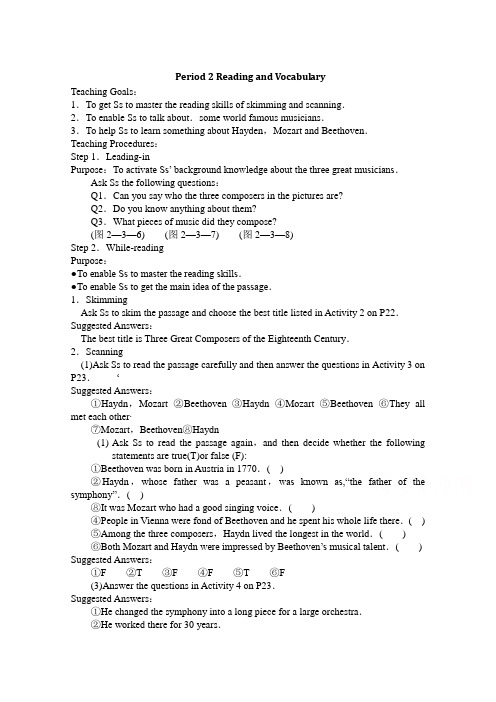
Period 2 Reading and VocabularyTeaching Goals:1.To get Ss to master the reading skills of skimming and scanning.2.To enable Ss to talk about.some world famous musicians.3.To help Ss to learn something about Hayden,Mozart and Beethoven.Teaching Procedures:Step 1.Leading-inPurpose:To activate Ss’ background knowledge about the three great musicians.Ask Ss the following questions:Q1.Can you say who the three composers in the pictures are?Q2.Do you know anything about them?Q3.What pieces of music did they compose?(图2—3—6) (图2—3—7) (图2—3—8)Step 2.While-readingPurpose:●To enable Ss to master the reading skills.●To enable Ss to get the main idea of the passage.1.SkimmingAsk Ss to skim the passage and choose the best title listed in Activity 2 on P22.Suggested Answers:The best title is Three Great Composers of the Eighteenth Century.2.Scanning(1)Ask Ss to read the passage carefully and then answer the questions in Activity 3 on P23.‘Suggested Answers:①Haydn,Mozart ②Beethoven ③Haydn ④Mozart ⑤Beethoven ⑥They all met each other·⑦Mozart,Beethoven⑧Haydn(1)Ask Ss to read the passage again,and then decide whether the followingstatements are true(T)or false (F):①Beethoven was born in Austria in 1770.( )②Haydn,whose father was a peasant,was known as,“the father of the symphony”.( )⑧It was Mozart who had a good singing voice.( )④People in Vienna were fond of Beethoven and he spent his whole life there.( )⑤Among the three composers,Haydn lived the longest in the world.( )⑥Both Mozart and Haydn were impressed by Beethoven’s musical talent.( ) Suggested Answers:①F ②T ③F ④F ⑤T ⑥F(3)Answer the questions in Activity 4 on P23.Suggested Answers:①He changed the symphony into a long piece for a large orchestra.②He worked there for 30 years.③He composed more than 600 pieces of music.④At that time he was just six years old.⑤They were friends for ten years.⑥His father taught him.⑦No,he continued composing though he was deaf.Step 3.Post-readingPurpose:To enable Ss to talk about the three great musicians.?1.Pair work(1)Ask Ss to£U in the blanks according to the information given in the passage.Haydn, who w as born in___ is known as “the father of the symphony”.Because he_____.He spent_____ years of his_____ working______.In______ ,he met a person named ______and Haydn was_____ by the man.Later they were friends.Mozart had _____from a very early age.So,he composed _____au his life,though his lifetime was only____ years.Also,there was a man by whom Mozart was_____ very much.He was_____,who showed great_____ in music as well.Beethoven was born in______,but Haydn encouraged him to______,where he finally became_____.Beethoven stayed there for_____.Although he became_____ during the last year of his life,but he_____.Suggested Answers:①Austria ②changed the symphony into a long piece for a large orchestra ③30④life ⑤at the court of a prince in eastern Austria ⑥1781 ⑦Mozart ⑧impressed⑨musical talent ⑩more than 600 pieces of music ⑾35 ⑿impressed ⒀Beethoven ⒁talent ⒂Germany ⒃move to Vienna ⒄famous ⒅the rest of his life ⒆completely deaf ⒇continued composing2.DiscussionHave a discussion about the following questions:(1)Had you heard of any of these composers before you read the passage?(2)Is it important to know anything about classical music?(3)Is Chinese classical music different from European classical music?Step 4.Language PointsPurpose:To enable Ss to master the language points in the passage.Listen to the tape and follow it in a low voice.Then Ss are divided into four groups.Ask them to discuss the important and difficult language points.1.change...into…把……变成……E.g.(1)Heat changes water into steam.(2)This classroom was changed into a reading room.※[拓展]change…for...用……换……E.g. I’11 change this old car for a new one.2.impress+It给予某人深刻印象;使某人钦佩而起敬(常用被动语态,不可用于进行时)E.g.(1)The film impressed a lot of people.(2)1 was deeply impressed by/at/with his speech.※[拓展]impress+It+on/upon sb使(某人)铭记……;使(某人)深深意识到……E.g. My father impressed the importance of work on me.3.talent n天才,天赋※[比较]talent,genius和gift这三个词语都可表示“天才;A-能”,其中genius语气最强,指天生的智慧和创造才能,也指有天赋的人。
辽宁省沈阳市第二十一中学高一英语(外研版,必修2)习题:Module_3_Music单元测试1
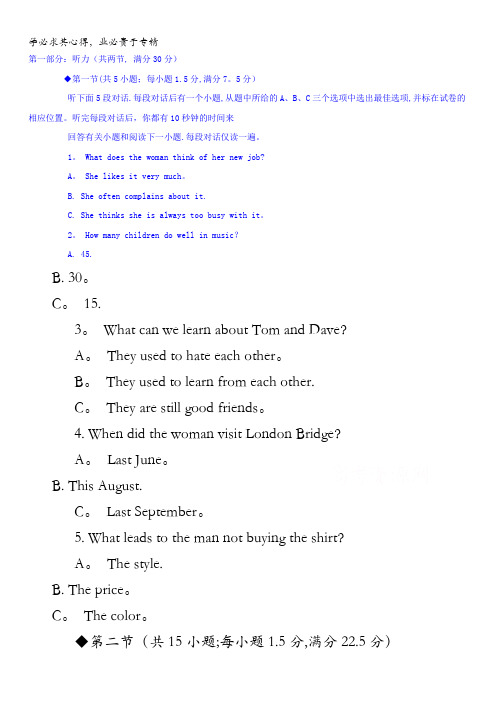
第一部分:听力(共两节, 满分30分)◆第一节(共5小题;每小题1.5分,满分7。
5分)听下面5段对话.每段对话后有一个小题,从题中所给的A、B、C三个选项中选出最佳选项,并标在试卷的相应位置。
听完每段对话后,你都有10秒钟的时间来回答有关小题和阅读下一小题.每段对话仅读一遍。
1。
What does the woman think of her new job?A。
She likes it very much。
B. She often complains about it.C. She thinks she is always too busy with it。
2。
How many children do well in music?A. 45.B. 30。
C。
15.3。
What can we learn about Tom and Dave?A。
They used to hate each other。
B。
They used to learn from each other.C。
They are still good friends。
4. When did the woman visit London Bridge?A。
Last June。
B. This August.C。
Last September。
5. What leads to the man not buying the shirt?A。
The style.B. The price。
C。
The color。
◆第二节(共15小题;每小题1.5分,满分22.5分)听下面5段对话或独白.每段对话或独白后有几小题,从每题所给的A、B、C三个选项中选出最佳选项,并标在试卷的相应位置.听每段对话或独白前,你将有时间阅读各个小题,每小题5秒钟;听完后,各小题将给出5秒钟的作答时间。
每段对话或独白读两遍.听第6段材料,回答第6至8题。
6. Where did the man work as a teacher?A. In Paris.B. In Washington.C. In New York。
辽宁省沈阳市第二十一中学高中英语 Module 3 Music Reading课件 外研版必修
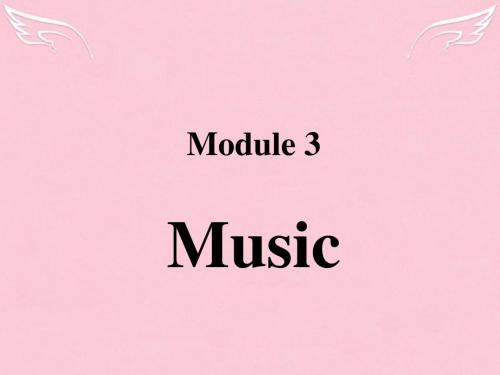
Read the passage about the three composers.
Haydn
Mozart
Beethoven
Listen to the tape and choose the best title.
Then Mozart met Beethoven and was impressed by him. It was __________ Haydn who __________ encouraged Beethoven to move to Vienna. Beethoven became very popular _______ in the Austria. As he grew older, he began to go _____ deaf . He became completely deaf during the last years of his life, but he ____________________. continued composing
He worked in eastern Austria for 30 years.
Read Part 2 and answer the questions.
1. How many pieces of music did Mozart compose? Over 600 pieces of music. 2. How old was he when he played for the Empress of Austria? When he was six years old. 3. How long were Mozart and Haydn friends? For ten years.
辽宁省沈阳市第二十一中学高中英语 Module 3 Music Language Points课件 外研版必修2

完成句子 Linda was very upset about ____________. losing her job 琳达因为丢了工作很沮丧。
• Other composers had written symphonies before Haydn, but he changed the symphony into a long piece for a large orchestra.
பைடு நூலகம்
He only lived 35 years and he composed more than 600 pieces of music. • compose vt. 作曲,创作,组成
He was composing at the piano at the age of seven. Water is composed of hydrogen and oxygen.
词义辨析:create, compose, design, invent, make, produce 这些动词均有“创造,制作”之意。 create: 侧重创造出来的东西以前并不存在, 或者指独具特色的创作。 compose: 多指音乐或诗歌、画的创作。
design: 主要指在艺术或技术领域的创作设计, 强调构思多于实际制造。 invent: 主要用于科技领域,指通过思考、研 究或实验制造出新的前所未有、极为有用的东 西。 make: 最普通用词,指任何东西的创作或制造。
His family is going to have a long journey. 他一家人准备作一次长途旅行。 His whole family are watching TV now. 他一家人正在看电视。
完成句子 ①There was ____________________ a large/ small audience in the theatre. 剧院里有很多观众/观众真少。
辽宁省沈阳市第二十一中学高中英语-Module-3-Music-语法练习-外研版必修2
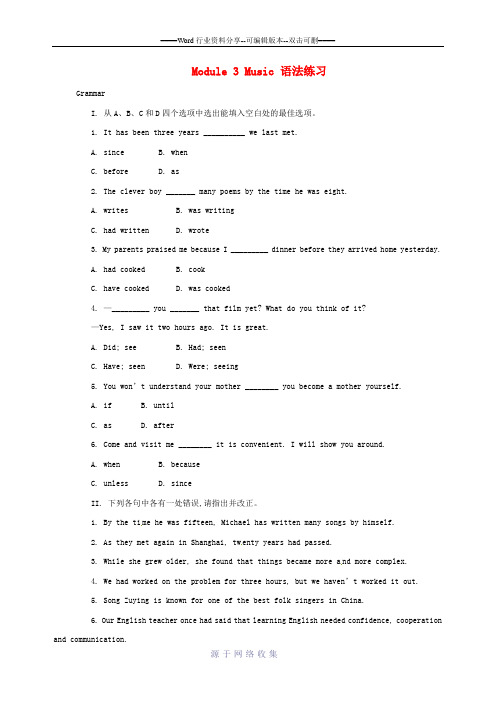
Module 3 Music 语法练习GrammarI. 从A、B、C和D四个选项中选出能填入空白处的最佳选项。
1. It has been three years __________ we last met.A. sinceB. whenC. beforeD. as2. The clever boy _______ many poems by the time he was eight.A. writesB. was writingC. had writtenD. wrote3. My parents praised me because I _________ dinner before they arrived home yesterday.A. had cookedB. cookC. have cookedD. was cooked4. —_________ you _______ that film yet? What do you think of it?—Yes, I saw it two hours ago. It is great.A. Did; seeB. Had; seenC. Have; seenD. Were; seeing5. You won’t understand your mother ________ you become a mother yourself.A. ifB. untilC. asD. after6. Come and visit me ________ it is convenient. I will show you around.A. whenB. becauseC. unlessD. sinceII. 下列各句中各有一处错误,请指出并改正。
1. By the ti me he was fifteen, Michael has written many songs by himself.2. As they met again in Shanghai, tw enty years had passed.3. While she grew older, she found that things became more a nd more complex.4. We had worked on the problem for three hours, but we haven’t worked it out.5. Song Zuying is known for one of the best folk singers in China.6. Our English teacher once had said that learning English needed confidence, cooperation and communication.7. Joseph Haydn, an Austrian composer, called "the father of the symphony".III. 短文改错。
辽宁省沈阳市第二十一中学高中英语 Module 3 Music Language Points课件

3
探索音乐历史
研究音乐的演变和发展过程,了解不同音乐时期和风格的特点和影响。
音乐的创作和演奏技巧
创作
通过编曲、谱曲和歌词创作, 将个人的情感和创意转化为 音乐作品。
演奏
通过练习和掌握乐器技巧, 能够以个人或团队形式将音 乐作品演绎出色。
表演
通过舞台表演和互动,将音 乐作品与观众共享,创造出 难忘的音乐体验。
流行音乐是广泛受欢迎的音乐类型,通常取材于当代文化,具有简单易懂的旋律和歌词。
古典音乐
古典音乐具有严谨的结构和复杂的旋律,经典作品常常以交响乐团或独奏形式演奏。
民族音乐
民族音乐代表了不同地区和文化的独特风格,常常运用特殊的乐器和节奏。
音乐的语言要素
1 旋律
2 节奏
旋律是一系列有机连接的音符,创造出独 特的音乐形式和结构。
辽宁省沈阳市第二十一中 学高中英语 Module 3 Music Language Points课 件 外研版必修 (2)
音乐学科介绍
音乐的定义和作用
音乐是一种跨越语言和文化的艺术形式,通过声音和节奏表达情感、传递信息。它能够激发情感、放松 身心,让人们共同分享美的体验。
音乐的分类与特点
流行音乐
节奏是音乐中重复出现的强或弱的音符组 合,给予音乐动力和感觉。
3 和声
4 音色
和声是不同音符同时发声的组合,创造出 音乐的和谐和丰富性。
音色是不同乐器或声音来源产生的独特音 质,为音乐增添多样化和个性化。
音乐的表现形式
交响乐团
交响乐团是由不同乐器组成的 大型乐团,能够演奏出复杂而 庄重的音乐作品。
爵士乐团
爵士乐团以即兴创作和富有活 力的表演闻名,展示了音乐的 灵活性和自由度。
辽宁省沈阳市第二十一中学高中英语 Module Three My First Ride on a Train 1教案 外研版必修1
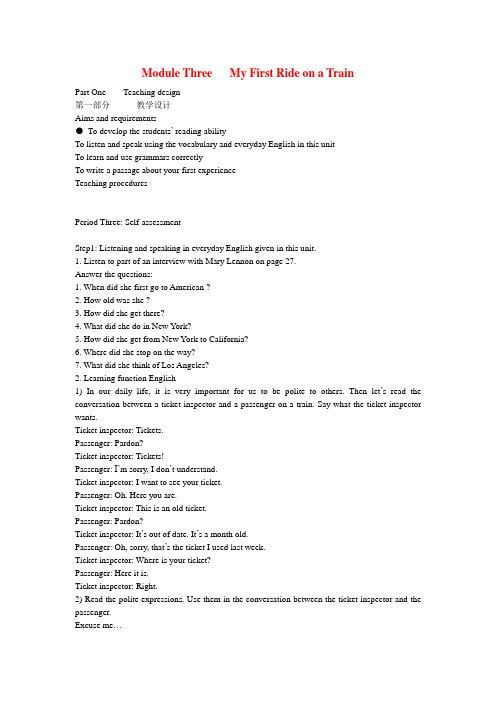
Module Three My First Ride on a TrainPart One Teaching design第一部分教学设计Aims and requirements●To develop the students’ reading abilityTo listen and speak using the vocabulary and everyday English in this unitTo learn and use grammars correctlyTo write a passage about your first experienceTeaching proceduresPeriod Three: Self-assessmentStep1: Listening and speaking in everyday English given in this unit.1. Listen to part of an interview with Mary Lennon on page 27.Answer the questions:1. When did she first go to American ?2. How old was she ?3. How did she get there?4. What did she do in New York?5. How did she get from New York to California?6. Where did she stop on the way?7. What did she think of Los Angeles?2. Learning function English1) In our daily life, it is very important for us to be polite to others. Then let’s read the conversation between a ticket inspector and a passenger on a train. Say what the ticket inspector wants.Ticket inspector: Tickets.Passenger: Pardon?Ticket inspector: Tickets!Passenger: I’m sorry, I don’t understand.Ticket inspector: I want to see your ticket.Passenger: Oh. Here you are.Ticket inspector: This is an old ticket.Passenger: Pardon?Ticket inspector: It’s out of date. It’s a month old.Passenger: Oh, sorry, that’s the ticket I used last week.Ticket inspector: Where is your ticket?Passenger: Here it is.Ticket inspector: Right.2) Read the polite expressions. Use them in the conversation between the ticket inspector and the passenger.Excuse me…Could I (see your ticket ?)Could I possibly (see your ticket?)Would you mind (showing me your ticket?)Would you mind (if I saw your ticket? )I am very sorry but ( this is an old ticket ).The fact is that ( it’s out of date).3) Then, ask them to work in pairs. Practise the conversation.Step2. Multiple choices1. _____ I met him, he was playing chess with his father.A. For the first timeB. The first timeC. When the first timeD. When for the first time2. Where _______ ?A. you think, will the group of people goB. you think, the group of people will goC. do you think, will the group of people goD. do you think, the group of people will go3. Lisa is ____ our good teacher, she is also our good friend.A. more thanB. rather thanC. other thanD. less than4. He____ his wife and children and went abroad alone three years later.A. gave upB. gave inC. gave outD. gave off5. I was very sleepy. I tried ____ my eyes open but I couldn’t.A. keepingB. having keptC. to have keptD. to keep6. In the morning we ate delicious meals _____ by my father.A. cookedB. cookingC. to cookD. having cooked7. ---- Now, where is my purse?---_______! We will be late for the picnic.A. Take your timeB. Don’t worryC. Come onD. Take it easy相关高考题8. --- I remembered I ____ my bag somewhere around here.--- Really? I never saw it.A. leftB. leaveC. was leavingD. had left9. --- What is the weather like tomorrow, John?--- Well, I ____ it , for the scenic pictures drew my attention as the weather forecast was going on.A. was missingB. missedC. will missD. had missed10. Slowly the old woman took out her pocket book, and an old photograph ____ out of it.A. droppedB. was droppedC. was droppingD. had been dropped11. --- How do you deal with the agreement between the company and the customers?--- The key_____ the problem is to meet the demand _____ by the customers.A. to solving, makingB. to solving, madeC. to solve, makingD. to solve, make12. When he came back ,he found the bag he had _____ over the seat was gone.A. left to hangB. left hangingC. left hungD. to leave hanging13. The discussion _____ alive when an interesting topic was brought in.A. was comingB. had comeC. has comeD. came14.--- I hear Jane has gone to the Holy Island for her holiday.---- Oh, how nice! Do you know when she _____?A. was leavingB. had leftC. has leftD. left15. She ____ hairstyle in her hometown before she came to Chongqing for a better job.A. would changeB. has changedC. changedD. was changing( Keys: 1----5.BDAAA 6----10.ACABA 11----15.BBDDC)Step 3: A cloze testRead the following story and choose a proper word to each blank in the story from the given words in every group and make the story complete in meaning and structure.Not long ago ,an accident happened at Walt Disney and it touched me greatly. A guest was _1___ out of our Polynesian Village resort (度假胜地) at Walt Disney when she was asked how she ___2__ her visit .She told the front –desk clerk she had had a (an) _3___ vocation, but was heartbroken about _4___ several rolls of Kodak color film she had not yet __5__ . At that moment she was particularly __6___ over the loss of the pictures she had shot at our Polynesian Luau , __7___ this was a memory she especially treasured.Now, please understand that we have no written service rules __8___ lost photos in the park.__9____ the clerk at the front desk __10___ Disney’s idea of caring for __11___. She asked the woman to leave her a couple rolls of __12____ film, promising she would take care of the rest of our show at Polynesian Luau.Two weeks later the guest received a _13___at her home. In it were photos of all the actors of our show, and they were _14___ signed by each performer. There were also_15___ of the public procession(游行队伍) and fireworks in the park, taken by the front-desk clerk in her own __16__ after work. I happened to know this __17___ because this guest wrote us a letter. She said that__18__ in her life had she received such good service from any business.Excellent __19__ does not come from policy (政策性的) handbooks. It comes from some __20___ people and from an encouraging culture.1. A. working B. checking C. trying D. staying2. A. expected B. realized C. paid D. enjoyed3. A. disappointing B. wonderful C. uncomfortable D. important4. A. taking B. dropping C. losing D. breaking5. A. developed B. taken C. washed D. loaded6. A. silly B. nervous C. calm D. sad7. A. when B. where C. as D. which8 .A. covering B. finding C. making D. keeping9. A. Excitedly B. Fortunately C. Therefore D. Quietly10.A.understood B. reminded C. trusted D. discovered11.A.workers B. guests C. managers D. clerks12.A.printed B. shot C. unused D. recorded13.A.film B. card C. camera D. packet14.A.frequently B. personally C .alone D. actually15.A.rules B. pictures C. handbooks D. performances.16.A.case B. work C. time D. position17.A.story B. place C. photo D. show18.A.only B. almost C. never D. nearly19.A.advice B. experience C. quality D. service20.A.care B. serve C. like D. know (Keys: 1----5 BDBCA 6----10 DCABA 11----15BCDBB 16----20 CACDA)Step 4: Translate the following into English paying more attention to the bold words and phrases. 我们看到远处有灯光。
辽宁省沈阳市第二十一中学高中英语Module3MyFirstRideonaTrain1教案外研版必修
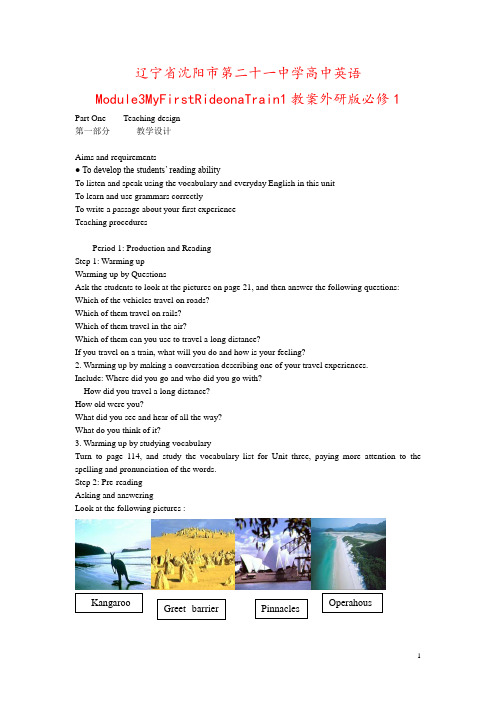
辽宁省沈阳市第二十一中学高中英语Module3MyFirstRideonaTrain1教案外研版必修1Part One Teaching design第一部分教学设计Aims and requirements● To develop the students’ reading abilityTo listen and speak using the vocabulary and everyday English in this unitTo learn and use grammars correctlyTo write a passage about your first experienceTeaching proceduresPeriod 1: Production and ReadingStep 1: Warming upWarming up by QuestionsAsk the students to look at the pictures on page 21, and then answer the following questions: Which of the vehicles travel on roads?Which of them travel on rails?Which of them travel in the air?Which of them can you use to travel a long distance?If you travel on a train, what will you do and how is your feeling?2. Warming up by making a conversation describing one of your travel experiences.Include: Where did you go and who did you go with?How did you travel a long distance?How old were you?What did you see and hear of all the way?What do you think of it?3. Warming up by studying vocabularyTurn to page 114, and study the vocabulary list for Unit three, paying more attention to the spelling and pronunciation of the words.Step 2: Pre-readingAsking and answeringLook at the following pictures :What you see fromKangarooPinnacles OperahousGreet barrierthe pictures are beautiful sceneries in Australia. Then do you know:Q1: How many people live there?Q2: What is the name of the capital city?Q3: Where do you think most of the people live in the central part or on the coast?Q4: What kind of Australian animals do you know?Suggested answers:1). It is the 6th large country in the world, but has a relatively small population. There are 19,731,984 people living there.2). The capital city---Canberra. Canberra is a young capital. After the federation of Australia in 1901, Melbourne and Sydney tried to claim national capital status. In 1908, a solution was found by selecting a location somewhere in-between.3). On the east/southeast coast. Because much of the central and western part of the country is uninhabitable.4). koala bear. kangaroo2. Introduce some new wordsShow the following new words from the text and ask them to read all together twice each word while correcting their pronunciation.Ok , now let’s have a spelling quiz. Read every sentence and write out a word in the box above, using a proper form of the words.Vast areas of land have become _____ .The group of people are all ____ in psychology.His ____ visit surprised me very much.A good cyclist can cover ____ of over a hundred miles a day.Let’s stop and admire the _____ of the mountain.The company is known for its high-quality ____.(Keys: desert, experts, midnight, distances, scenery, product)Step 3: ReadingLeading-inAfter talking about some information about Australia, we restudied some new words in this text, maybe every one of us is eager to pay a visit to Australia and appreciate the beautiful sceneries there, right? Ok, now let’s learn the passage “My first ride on a train”. After reading, answering the following questions:1)Did Alice travel on the train a long time ago?2)Was her destination on the coast of Australia?3)Was the scenery the same during the whole journey?4)Did she study while she was on the train?5)Did the Australians use horses to travel to the central part of the country?6)Do they still use camels to deliver goods?Answers:1) No. She travelled on the train recently.2) No, it was Alice Springs in the central part of Australia.3) No, at first there were fields, then it was desert.4) Yes, she studied Chinese.5) Yes, at first, but the horses didn’t like the hot weather.6) No, they use the train now.2. Fast reading to get the general idea of each paragraph.Para.1: I had my first ride on a long distance train.Para.2: The scenery along the railway.Para.3: How I spent the time on the train.Para.4: Why is the train called Ghan?Para.5: Things about the camels.Para.6: The fate of the camels nowadays.3. Listening to the tape of the text and try to find which of the following words appear in the story.( Keys: distance , scenery ,desert ,comfortable ,passenger, get on ,shoot ,in the middle of ,more than ,be short for )4. Detailed reading for information.i. Read the following sentences and decide whether they are true (T) or false (F) according to the text.The author and his friends spent three days and nights on the train.At night, it was windy and cold.They went back with wool and other products.The camels were needed in Afghan till 1925.They didn’t need the camels any more because the camels couldn’t help them for traveling a lo ng distance.(Keys: 1.F 2.F 3.T 4.F 5.F )ii. Put the sentences in the right order according to the text1)Camels were trained to carry supplies back form the central part.2)Camels were shot because of the new railway line built by the government.3)They bought camels from Afghanistan.4)Australians needed a way to the central country.5)They tried riding horses, but failed.(Keys : 4.5.3.1.2 )Step 4: Reading practiceRead the following passage within 5 minutes and make a better choice to each question.The first person to reach the South Pole was Roald Amundsen, a Norwegian explorer. Amundsen was born in Borge, near Oslo, Norway. He attended the University of Christiania and then joined the Norwegian navy.Amundesen made a three-year expedition in the Arctic(北极) beginning in 1903.He was thefirst to navigate(航行) Northwest Passage, a northern water route from the Atlantic(大西洋) to the Pacific (太平洋).But Amundsen’s greatest voyage began in 1910,at the end of the earth. He pla ned to go to the North Pole, but he heard that Robert Peary had already reached it. So instead Amundsen headed to the South Pole in his ship. He learned that a British expedition, led by Robert F.Scott, was also on its way there. Amundsen reached Antarctic(南极) in January,1911.He and his men had to wait out the bitter cold, windy winter on the edge of the ice before they could head for the South Pole.In October, they set out, with 52 well-trained dogs to pull their sledges. On the way to the Pole ,they climbed glaciers(冰川),went around huge cracks(裂口) in the ice, and survived freezing blizzards(暴风雪).Finally, on December 14, 1911, Amundsen placed the Norwegian flag at the South Pole. Scott and his men found the flag there when they reached the Pole a month later.Amundsen died in the Arctic 17 years later. He disappeared while making an air search for another explorer, Umber.The best title for the passage would be ____ .Amundsen , the first explorer to reach the SouthAmundsen’s adventureA brave personNever stop searchingWhy did Amundsen and his men set out for the South Pole in October while they reached Antarctic in January?It is a long way from Antarctic to the South Pole.The road was too icy to walk on.They didn’t have enough dogs for their s ledges.They had to wait until the winter had gone.Why did Amundsen go to the South Pole instead of the North Pole?He found it impossible to reach the North Pole.It was easier to get to the South Pole than to the North Pole.He just wanted to be the first one to reach either of the Poles.He learned someone was on his way to the South Pole.From the passage we can infer that _____.at the beginning of the 20th century ,many explorers had been to or were trying to reach the South and the North Pole.peopl e can’t reach the South Pole until winter.the purpose of those who want to reach the South Pole is only to place their national flag there. Scott and his men might feel excited and happy when they finally got to the South Pole and found someone had already been there.(Keys:1.A 2.D 3.C 4.A)Step 5:Homework1. Retell the text in your own words.2. Learn the new words again using the dictionary if necessary.3. Preview the Grammar ahead of time.。
高一英语 Module 3 Music教案 外研版必修2 教案
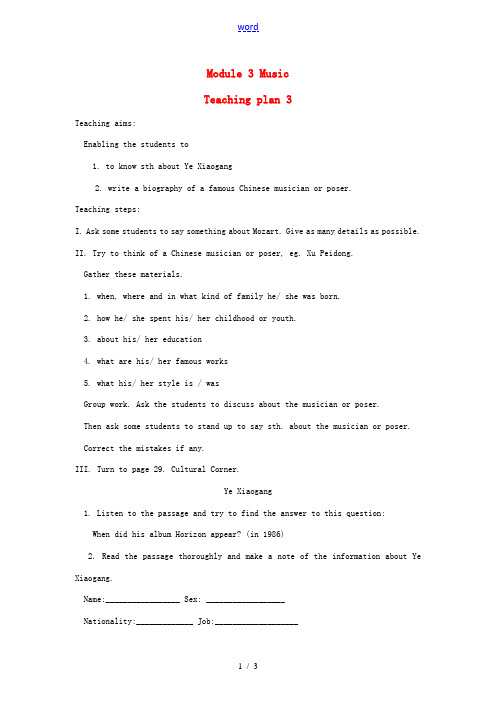
Module 3 MusicTeaching plan 3Teaching aims:Enabling the students to1. to know sth about Ye Xiaogang2. write a biography of a famous Chinese musician or poser.Teaching steps:I. Ask some students to say something about Mozart. Give as many details as possible. II. Try to think of a Chinese musician or poser, eg. Xu Peidong.Gather these materials.1. when, where and in what kind of family he/ she was born.2. how he/ she spent his/ her childhood or youth.3. about his/ her education4. what are his/ her famous works5. what his/ her style is / wasGroup work. Ask the students to discuss about the musician or poser.Then ask some students to stand up to say sth. about the musician or poser.Correct the mistakes if any.III. Turn to page 29. Cultural Corner.Ye Xiaogang1. Listen to the passage and try to find the answer to this question:When did his album Horizon appear? (in 1986)2. Read the passage thoroughly and make a note of the information about Ye Xiaogang.Name:_________________ Sex: __________________Nationality:_____________ Job:___________________Main achievements: ____________________________________________Style of music: ____________________________What he did or happened to him in the following years:1955: ___________________________________________From 1978 to 1983: ___________________________________________1985: ___________________________________________1986: ___________________________________________1996: ___________________________________________3. Check the answers with the whole class. Then ask one or two students to say sth about Ye Xiaogang with the help of the notes made.4. Language points:1) work as2) leading modern posers 主要作曲家leading article 社论the leading cause 主要原因a leading role 主角3) mix A with B= mix A and B togethermix win with waterNever mix with such people.mix up 弄混,弄错It’s mon to mix him up with his brother.弄乱mix up the papersmix up those data4) receive many prizes5) part ofIV. Homework:Write a short passage about the Chinese musician or poser we talked about this period.。
辽宁省沈阳市第二十一中学高中英语 Module 3 Music Period 4 Grammar导学案(无答案)外研版必修2
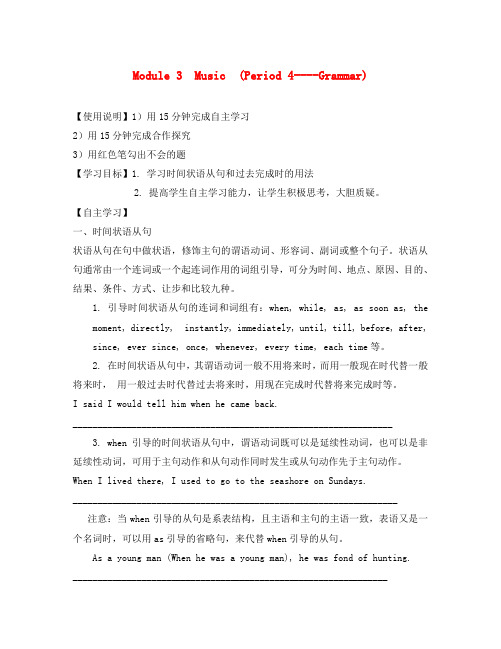
Module 3 Music (Period 4----Grammar)【使用说明】1)用15分钟完成自主学习2)用15分钟完成合作探究3)用红色笔勾出不会的题【学习目标】1. 学习时间状语从句和过去完成时的用法2. 提高学生自主学习能力,让学生积极思考,大胆质疑。
【自主学习】一、时间状语从句状语从句在句中做状语,修饰主句的谓语动词、形容词、副词或整个句子。
状语从句通常由一个连词或一个起连词作用的词组引导,可分为时间、地点、原因、目的、结果、条件、方式、让步和比较九种。
1. 引导时间状语从句的连词和词组有:when, while, as, as soon as, themoment, directly, instantly, immediately, until, till, before, after, since, ever since, once, whenever, every time, each time等。
2. 在时间状语从句中,其谓语动词一般不用将来时,而用一般现在时代替一般将来时,用一般过去时代替过去将来时,用现在完成时代替将来完成时等。
I said I would tell him when he came back._________________________________________________________________3. when引导的时间状语从句中,谓语动词既可以是延续性动词,也可以是非延续性动词,可用于主句动作和从句动作同时发生或从句动作先于主句动作。
When I lived there, I used to go to the seashore on Sundays.__________________________________________________________________ 注意:当when引导的从句是系表结构,且主语和主句的主语一致,表语又是一个名词时,可以用as引导的省略句,来代替when引导的从句。
辽宁省沈阳市第二十一中学高中英语 Module 3 Music Listening speaking writing课件 外研版必修
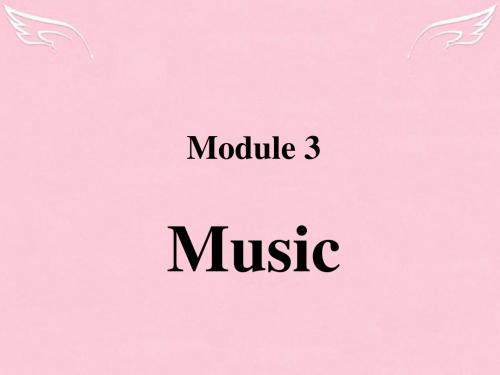
Listen and fill in the blanks.
The Beatles were the most __________ successful band in the
history of popular music. The band ___________ consisted of _______
Listen to the tape and decide if these sentences are true or false. T 1. Three of the Beatles played guitar.
F
2. The Beatles all came from different places in England. 3. Americans liked the Beatles when they toured for the first time.
Hey Jude is a song by the English rock band The Beatles, written by Paul McCartney. The song was sung in the London Olympic Game opening ceremony.
Complete the sentences using the vocabulary in the box.
album influence ballad lyrics band catchy complex solo artist split up tune
The song written by him is very c______, atchy so I like it very much. I like the l_________ of the song. It tells us yrics about his life and the words of the song are omplex so they are easy to not c________, understand.
- 1、下载文档前请自行甄别文档内容的完整性,平台不提供额外的编辑、内容补充、找答案等附加服务。
- 2、"仅部分预览"的文档,不可在线预览部分如存在完整性等问题,可反馈申请退款(可完整预览的文档不适用该条件!)。
- 3、如文档侵犯您的权益,请联系客服反馈,我们会尽快为您处理(人工客服工作时间:9:00-18:30)。
Module 3 Music
I.教学内容分斩
本模块以“Music”为话题。
学生通过本模块的学习可以了解古今中外的音乐家,提高他们的音乐欣赏水平,培养他们对音乐的评价和鉴赏能力,从而丰富学生的音乐知识,提高学生的艺术修养。
Introduction部分通过设计的两个活动让学生复习和学习一些常见的乐器的名称,激发学生学习本模块的兴趣。
Reading and Vocabulary该部分向同学们介绍了音乐家海顿、莫扎特和贝多芬以及他们的伟大成就。
让同学们在阅读的过程中了解音乐家的奋斗历程,树立正确的人生观和价值观。
通过相关的活动,训练学生的综合语言能力。
Grammar 1学习并巩固时间状语从句。
Writing要求学生阅读一封外国朋友的电子邮件,并根据问题写一封回信。
Function通过回答问题和完成句子让学生懂得如何表达喜好和厌恶,从而初步培养学生的鉴赏能力。
Listening and Vocabulary首先通过听力活动帮助学生了解和学习有关英国乐队The Beatles的背景知识,接着让学生学习新的词汇。
在训练学生听力的同时考查学生的理解能力。
Grammar 2复习过去完成时态。
通过练习帮助学生巩固过去完成时态的基本用法。
Pronunciation学会如何在日常交际中使用升调和降调。
Everyday English要求学生掌握表达喜好的一些用语和有关音乐的日常用语。
Cultural Corner学习一篇有关著名作曲家叶小刚的文章,了解他的音乐经历和音乐成就,增强学生的民族自豪感。
Task训练学生仿写一篇介绍著名音乐家生平和作品的文章。
Module File对整个模块的学习内容进行归纳总结,有助于学生对所学知识进行复习和巩固。
II.教学重点和难点
1.教学重点
(1)本模块的生词和短语。
(2)弄清楚时间状语从句和过去完成时态的用法。
(3)谈论有关音乐的话题。
2.教学难点
(1)学会表达对音乐的喜好。
(2)学习时间状语从句和过去完成时态。
(3)学写有关自己音乐爱好的文章。
III.教学计划
本模块分五个课时:
第一课时:Introduction,Function,Everyday English
第二课时:Reading and Vocabulary
第三课时:Cultural Corner,Grammar 1,Grammar 2
第四课时:Listening and Vocabulary,Pronunciation
第五课时:Writing,Task,Module file IV.教学步骤。
